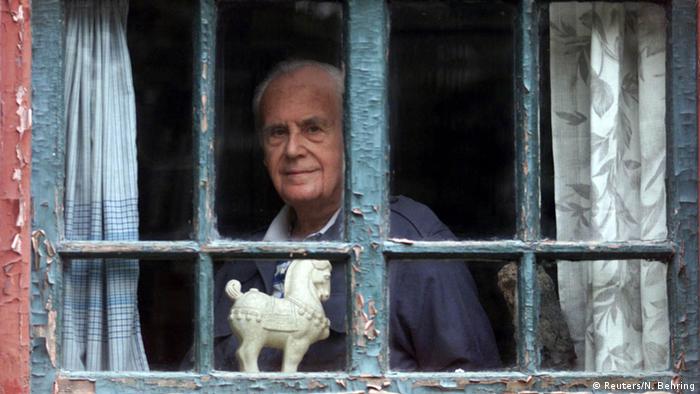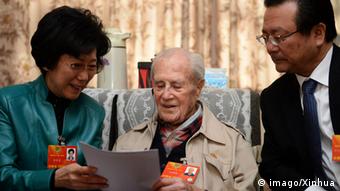《懸而未決的莒哈絲》p.235, note 78. 繆詠華根據法譯本轉譯,所以在紅色段有點不通順。
The sight was ordinary enough; what was strange was the rhythmical order with which my imagination had invested it; and the fact that the ordinary sight of two people getting into a cab had the power to communicate something of their own seeming satisfaction. The sight of two people coming down the street and meeting at the corner seems to ease the mind of some strain, I thought, watching the taxi turn and make off. Perhaps to think, as I had been thinking these two days, of one sex as distinct from the other is an effort. It interferes with the unity of the mind. Now that effort had ceased and that unity had been restored by seeing two people come together and get into a taxicab. The mind is certainly a very mysterious organ, I reflected, drawing my head in from the window, about which nothing whatever is known, though we depend upon it so completely. Why do I feel that there are severances and oppositions in the mind, as there are strains from obvious causes on the body? What does one mean by ‘the unity of the mind’? I pondered, for clearly the mind has so great a power of concentrating at any point at any moment that it seems to have no single state of being. It can separate itself from the people in the street, for example, and think of itself as apart from them, at an upper window looking down on them. Or it can think with other people spontaneously, as, for instance, in a crowd waiting to hear some piece of news read out. it can think back through its fathers or through its mothers, as I have said that a woman writing thinks back through her mothers. Again if one is a woman one is often surprised by a sudden splitting off of consciousness, say in walking down Whitehall, when from being the natural inheritor of that civilization, she becomes, on the contrary, outside of it, alien and critical. Clearly the mind is always altering its focus, and bringing the world into different perspectives. But some of these states of mind seem. even if adopted spontaneously, to be less comfortable than others. In order to keep oneself continuing in them one is unconsciously holding something back, and gradually the repression becomes an effort. But there may be some state of mind in which one could continue without effort because nothing is required to be held back. And this perhaps, I thought, coming in from the window, is one of them. For certainly when I saw the couple get into the taxicab the mind felt as if, after being divided, it had come together again in a natural fusion. The obvious reason would be that it is natural for the sexes to co-operate. One has a profound, if irrational, instinct in favour of the theory that the union of man and woman makes for the greatest satisfaction, the most complete happiness. But the sight of the two people getting into the taxi and the satisfaction it gave me made me also ask whether there are two sexes in the mind corresponding to the two sexes in the body, and whether they also require to be united in order to get complete satisfaction and happiness? And I went on amateurishly to sketch a plan of the soul so that in each of us two powers preside, one male, one female; and in the man’s brain the man predominates over the woman, and in the woman’s brain the woman predominates over the man. The normal and comfortable state of being is that when the two live in harmony together, spiritually co-operating. If one is a man, still the woman part of his brain must have effect; and a woman also must have intercourse with the man in her. Coleridge perhaps meant this when he said that a great mind is androgynous. It is when this fusion takes place that the mind is fully fertilized and uses all its faculties. Perhaps a mind that is purely masculine cannot create, any more than a mind that is purely feminine, I thought. But it would he well to test what one meant by man-womanly, and conversely by woman-manly, by pausing and looking at a book or two.
A room of one’s own, by Virginia Woolf
Six https://ebooks.adelaide.edu.au/w/woolf/virginia/w91r/chapter6.html
2014.10.22 早上錦坤兄來拿書--他上周託我買的套書《雜阿含經校釋》
(8冊,4000元)。談最多的是下月的譯藝獎,因為他要專題演講,可對今年的得獎者
不熟...... (都怪我懶,沒寫簡介。得獎者都是認識十年以上的朋友,他們在法文和
日文等領域的翻譯成績,很容易從"博客來"等網站找到.....)
恰巧看到繆詠華女士的一篇簡單自述,或可參考:
繆詠華新增了 2 張相片。
咳咳,明天本姑姑要進城去...本姑姑還能幹啥?還不就講莒哈絲麼?
話說這本《懸而未決的莒哈絲》訪談錄,2013-06-29就已經由麥田出版了,至今一年有餘,似乎依然風行不墜,還有人邀我前去分享。
我跟莒哈絲的姻緣開始得挺早。大三小說課,老師選了《如歌的中板》(Moderato cantabile,或譯為《安妮的戀情》)作為教材,大四的時候,適逢《情人》(L'amant)出版,由於莒哈絲情人的華人身份,這部小說自然就在華人世界引起額外關注。
莒哈絲喜歡用短句,閱讀起來、理解起來相對輕鬆。《情人》一書的書寫極其抒情,宛若一篇優美的散文,當初的確令我極其著迷、沈醉。我曾經一度成為不可救藥的莒迷,買了無數本她的著作,還曾經跑到諾曼地的黑石旅館,為的就是看那片她看過的大西洋,我當然也去過她位於拉丁區的 小公寓聖伯諾瓦街五號,也數度親赴她位於蒙巴納斯墓園的墓前憑弔過、緬懷過,我甚至還哭過,凡此種種,我在我的兩本著作《長眠在巴黎》《巴黎文學散步地圖》中均有所著墨。
此外,2014/08/08 聯經出版的《2014年瑪格麗特‧莒哈絲特刊》中,我也曾撰寫過一篇專文記述我成為「莒迷」的始末,有興趣的可以參閱我臉書的網誌連結:
有位我非常重視的朋友曾說:「莒哈絲有你這位代言人,她地下有知,也可以含笑九泉了。」
或許真是如此。笑~
美裔中國籍翻譯家沙博理去世
著名翻譯家沙博理週末在北京去世,享年98歲。值得注意的是,出生在美國的沙博理是極少數獲得中國國籍的西方裔人士。
(德國之聲中文網) 1915年,沙博理(Sidney Shapiro)出生在紐約。1947年,他首次來到中國。此前在二戰期間,美國軍方將其選中,讓他學習中文。
1948年,他和中國作家鳳子結婚,後者是中國共產黨的支持者。1949年,中共贏得內戰、奪取政權後,沙博理並沒有隨其他大多數西方人士離開中國。1963年,經總理周恩來特批,沙博理獲得了中國國籍。至今,中國國籍也只是授予極少數外國人,以表彰他們所作出的"特殊貢獻"。
他在翻譯界最為有名的一部作品是《水滸傳》英譯版,沙博理將書名譯為"Outlaws of the Marsh"。除此之外,他還向英語受眾譯介了巴金、茅盾等現當代中國作家的作品。
全力擁護中共 但從未加入
2010年,他被中國譯協授予"翻譯文化終身成就獎"。在接受新華社採訪時,沙博理說,作為翻譯家,他有責任讓世界認識到,中國擁有最為豐富的文化傳統。
1983年,沙博理當選全國政協委員,並一直連任至今。2006年中國"兩會"期間,他面對新華社的採訪,猛烈抨擊美國政界,認為美國不應當對中國人權狀況指手畫腳。他說:"美國的民主是民眾長期鬥爭的成果,但是在20世紀,美國的民主開始走下坡路……今日美國,情報機構有權截聽公民的電話,還能夠知道誰從圖書館借了什麼書。"
不過,沙博理卻從來沒有正式加入中國共產黨。他在自傳中寫道,他可能太過於特立獨行,不願意接受任何教條;"但我依然非常尊重中國共產黨,而且完全支持其綱領和目標。"
週六(10月18日)早晨,將近99歲的沙博理去世。其外孫女郭馨在致路透社的郵件中寫道:"作為他的孫輩,我擁有許多關於他的美好回憶。比如他奇特的幽默、傳奇的故事、出色的音樂品位、鍾情老電影。他是美裔猶太人出身,擅於充滿熱情地辯論,還喜愛新科技。"
Wikipedia:
沙博理(Sidney Shapiro,1915年12月23日-2014年10月18日)猶太人,出生於美國紐約,後歸化中華人民共和國國籍,翻譯家、作家。其中文名取「博學明理」之意。[1][2][3][4]
生平[編輯]
1915年12月23日,沙博理生於美國紐約。1937年自聖約翰大學法律系畢業後,當律師。第二次世界大戰期間,沙博理應徵入伍,加入美國陸軍服役,成為一名高射炮士兵。美國由於時局的需要,決定培養一批軍人學習世界語言,沙博理奉派學中文和中國的歷史文化。退役後,沙博理利用退伍津貼,先後在哥倫比亞大學、耶魯大學學中文。[4][1][2][3]
1947年3月,沙博理離開美國紐約赴中國上海。1947年4月,沙博理到達上海。過了一段時間,他開始在上海當律師。在上海,他接觸了中外左翼人士,由同情而投身中國共產黨領導的革命。他曾經利用自己的身份掩護革命青年躲避中國國民黨當局的追殺,幫左翼學生編輯支持土地改革的英文雜誌。他還曾經將律師事務所當作會址,同解放區代表商談通過中國國民黨的封鎖將藥品送往解放區。他曾經用當律師的收入支持鳳子在中國共產黨領導下創刊《人世間》雜誌。1948年5月16日,在鄭振鐸見證下,沙博理與演員兼作家鳳子結婚。婚後不久,鳳子被中國國民黨列入黑名單。1948年底,沙博理和鳳子乃離開上海赴北平。1949年10月1日,沙博理應邀參加中華人民共和國開國大典,此後在中國定居。1962年,沙博理和鳳子遷居什剎海南官房胡同,終生在此居住。1963年,沙博理的母親幾經周折從美國到北京看望沙博理,也見到了從未謀面的兒媳婦鳳子。1963年,在送走母親後,沙博理向所在單位提出了加入中華人民共和國國籍的申請,經中華人民共和國國務院總理周恩來親自批准,沙博理加入中華人民共和國國籍。[4][1][2][3]
中華人民共和國成立時,沙博理在對外文化聯絡局任英文翻譯。1951年10月,沙博理、葉君健、楊憲益、戴乃迭一起創辦第一本英文版《中國文學》,沙博理擔任譯審工作。1972年,沙博理調到人民畫報社,任英文改稿專家。1983年退休後,沙博理繼續參與國際文化傳播和對外文化交流活動。[4]
1966年文化大革命爆發後,沙博理也和其他中國人一樣參加了貼「大字報」等政治活動。但老朋友馬海德及時勸告他說,「文化大革命不是什麼好事情,你還是不要參加了。」1967年,沙博理接受所在單位布置的任務,開始翻譯《水滸傳》,他便遠離政治,專心從事翻譯工作。當時鳳子受衝擊被下放到五七幹校,女兒亞美在北京市通縣造紙廠工作。四年內,都是沙博理一個人在家,這種情況一直持續到1971年。1971年,沙博理作為外文局專家,獲得了一次回美國探親的機會。沙博理給周恩來總理寫了封信,希望能讓鳳子和自己一道赴美國探親。經周恩來總理多次努力,五七幹校僅允許鳳子回北京呆兩天,把沙博理送上飛機之後,鳳子不得不又返回五七幹校。《水滸傳》翻譯快結束時,「四人幫」得知沙博理計劃定書名為《Heroes of the Marsh》(水泊英雄),這與當時「評水滸」政治運動中「批宋江」、「批投降派」的論調相悖,遂要求沙博理更改書名,沙博理乃改以Outlaws取代Heroes,矇混過關,實際上Outlaws有「綠林好漢」之意,正符合《水滸傳》的本意,所以最終書名為《Outlaws of the Marsh》。[1][2]
1995年,沙博理獲中華全國文學基金會、中國作家協會中外文學交流委員會頒發「彩虹翻譯獎」。2009年,獲中國外文出版發行事業局「國際傳播終身榮譽獎」。2010年12月,獲中國翻譯協會頒發的「中國翻譯文化終身成就獎」。2011年4月,獲鳳凰衛視聯合海內外十多家華文媒體及機構評選的「影響世界華人終身成就獎」。2014年8月,獲第八屆「中華圖書特殊貢獻獎」。[4]
逸事[編輯]
- 沙博理回憶馮亦代的時候笑著說:「我們年輕的時候經常在一起,在我跟鳳子開始討論結婚還沒正式確定的時候,那傢伙就寫了一篇文章,賣給了《大公報》,賣了五塊錢,害得我們完全被動了,被逼著開了一個PARTY,結婚了。」[2]
- 《中國古代猶太人》被譯為希伯來文在以色列出版時,中華人民共和國和以色列尚未建立外交關係,接受邀請訪問以色列的沙博理夫婦成為以色列最早接待的兩位中華人民共和國客人。[2]
作品[編輯]
譯著
- Chao Shu-li, Rhymes of Li Yu-Tsai and other stories (李有才板話及其他故事), trans. by Sidney Shapiro, Beijing: Culture Press, 1950.
- Shi Yan, It happened at Willow Castle (柳堡的故事), trans. by Sidney Shapiro, Beijing: Culture Press, 1951.
- The Peking People's Art Theatre, Between Husband and Wife (夫妻之間), trans. by Sidney Shapiro, Beijing: The Peking People's Art Theatre, 1953.
- Liu Ching, Wall of Bronze (銅牆鐵壁), trans. by Sidney Shapiro, Beijing: The Peking People's Art Theatre, 1954.
- Mistress Clever (巧媳婦/古代故事畫庫), trans. by Sidney Shapiro, 1954.
- Xu Guangyao, The Plains are Ablaze (平原烈火), trans. by Sidney Shapiro, Beijing: The Peking People's Art Theatre, 1955.
- Chen Teng-ke, Living Hell (活人塘), trans. by Sidney Shapiro, Beijing: The Peking People's Art Theatre, 1955.
- Mao Tun, Spring silkworms and other stories (春蠶集), trans. by Sidney Shapiro, Beijing: Foreign Languages Press, 1956.
- Chin Chao-yang, Village Sketches (農村散記), trans. by Sidney Shapiro, Beijing: Foreign Languages Press, 1957.
- Yuan Ching, Kung Chueh, Daughters and Sons (新兒女英雄傳), trans. by Sidney Shapiro, Beijing: Foreign Languages Press, 1958.
- Du Pengcheng, Defend Yenan! (保衛延安), trans. by Sidney Shapiro, Beijing: Foreign Languages Press, 1958.
- Kao Yun-lan, Annals of a provincial town (小城春秋), trans. by Sidney Shapiro, Beijing: Foreign Languages Press, 1959.
- Soy Sauce and Prawns (醬油和對蝦), trans. by Sidney Shapiro, 1963.
- Liu Ching, The Builders (創業史), trans. by Sidney Shapiro, Beijing: Foreign Languages Press, 1964.
- Liu Ching, Builders of a New Life (創業史), trans. by Sidney Shapiro, Beijing: Foreign Languages Press, 1977.
- Pa Chin, The Family (家), trans. by Sidney Shapiro, Beijing: Foreign Languages Press, 1978.
- Chu Po, Tracks in the Snowy Forest (林海雪原), trans. by Sidney Shapiro, Beijing: Foreign Languages Press, 1978.
- Shi Nai'an, Luo Guanzhong, Outlaws of the Marsh (水滸傳), trans. by Sidney Shapiro, Beijing: Foreign Languages Press, 1980.
- Mao Dun, The Shop of the Lin Family & Spring Silkworms (林家鋪子、春蠶), trans. by Sidney Shapiro, Hong Kong: Chinese University Press, 2004.
- Deng Rong, Deng Xiaoping and the Cultural Revolution (我的父親鄧小平——文革歲月), trans. by Sidney Shapiro, Beijing: Foreign Languages Press, 2002.
- Mao Mao, Deng Xiaoping and the Cultural Revolution (我的父親鄧小平——文革歲月), trans. by Sidney Shapiro, Beijing: Foreign Languages Press, 2012.
- 中國現代名家短篇小說選,北京:外文出版社,2003年(內收沙博理譯的四篇小說:湖畔兒語(The Child at the Lakeside)、 《春桃》(Big Sister Liu)、 《月牙兒》(Crescent Moon)、 《小二黑結婚》(The Marriage of Young Blacky)
- 孫犁小說選[4]
專著
- Sidney Shapiro, An American in China, Beijing: New World Press, 1979.
- 沙博理,一個美國人在中國,程應瑞譯,北京:三聯書店,1984年
- Sidney Shapiro, My China, Beijing: New World Press, 1997.
- Sidney Shapiro, I Chose China, Hippocrene Books, 2000.
- Sidney Shapiro, My China, Beijing: Foreign Languages Press, 2005.
- 沙博理,我的中國,宋蜀碧譯,北京:北京十月文藝出版社,1998年
- Sidney Shapiro, Experiment in Sichuan, Beijing: New World Press, 1981.
- Sidney Shapiro, The Law and the Lore of China's Criminal Justice, Beijing: New World Press, 1990.
- Sidney Shapiro, A sampler of Chinese literature: From the Ming Dynasty to Mao Zedong, Beijing: Panda Books, 1996.
- Sidney Shapiro, Jews in old China, Hippocrene Books, 1984.
- 沙博理,中國古代猶太人——中國學者研究文集點評,北京:新世界出版社,2008年
- Sidney Shapiro, Ma Heide, San Francisco: Cypress Press, 1993.
- Sidney Shapiro, Ma Haide: the saga of American doctor george hatem in China (馬海德傳), Beijing: Foreign Languages Press, 2004.[4]
表演
- 1962年電影《停戰以後》飾 談判調停人
- 1976年電影《長空雄鷹》飾 駐朝鮮的美國空軍將領
- 1981年電影《西安事變》飾 端納
參考文獻[編輯]
- ^ 第十一屆全國政協委員名單. 新華社北京1月25日電 中國人民政治協商會議第十一屆全國委員會委員名單(共2237人,2008年1月25日政協第十屆全國委員會常務委員會第二十次會議通過). 2008年1月25日 [2013-04-09].
- ^ 全國政協信息-沙博理. 全國政協委員會. [2013-04-09].
^ 1.0 1.1 1.2 1.3 沙博理:中國是我的國家,光明網,2012-01-07
^ 2.0 2.1 2.2 2.3 2.4 2.5 沙博理美國大兵的中國人生,新浪,2005-05-30
^ 3.0 3.1 3.2 沙博理:我是用一支真實的筆寫《我的中國》,新華網,2006-06-16
^ 4.0 4.1 4.2 4.3 4.4 4.5 4.6 4.7 4.8 最年長外裔全國政協委員沙博理逝世 周恩來批准他入籍,鳳凰網,2014-10-21




沒有留言:
張貼留言